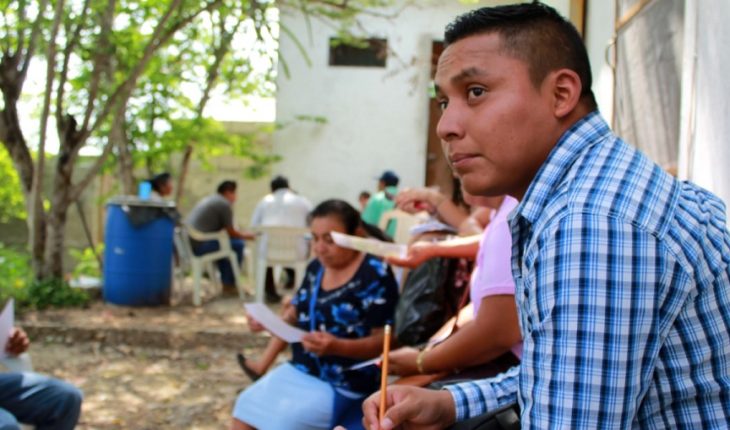Wilbert Caamal Cauich sought work for eight months after graduating from the Bachelor’s degree in information and communication technologies from the Technological University of Candelaria, in the municipality of the same name, in Campeche. No one gave him a job because he had no experience.
“I even entered one as a training, which lasted three months, as a telephone adviser to see if I could use it later on a control table. But since I wasn’t paid and I was just spending on tickets and food, I didn’t finish it. ” He then learned about promotional on television from the Young federal government program building the future, and enrolled.
READ: With 27000 vacancies, starts this Thursday in Tlalnepantla the youth program building the Future
As a Fellow of that program, Wilbert is training in the Civil society organization Muuch Kambal, which works to stop deforestation and the use of agrochemicals in the Yucatan Peninsula, as well as to protect and encourage beekeepers, agro-ecology, The knowledge and the Mayan culture, but also the rights of the communities and the health.
Of unemployment went on to collaborate in an organization that, as he says, has allowed him to rethink his future and discover his community, besides that he has been able to train in photography and video.
But Wilbert’s luck is not shared by Erika Ortiz, a lawyer who graduated almost a year ago from the Autonomous University of the State of Mexico, and who today works in bottling La Margaritas, Coca Cola, as a sales promoter.
This work means visiting between six and twelve customers of the soft drink every day. It is up to you to clean the refrigerators, make the “front” (Arrange the product to have a good view) and also inform the shopkeeper about the promotions and the missing, and encourage him to make the order.
You know that you will have little experience of this year, but you have not found work in your area and there were no other options in this program.
There is work, but in what
The Youth program building the future, one of the most important of the government of President Andrés Manuel Lopez Obrador, in charge of the Secretary of Labor and Social Welfare (STPS), offers people between 18 and 29 years who are not working or studying Link them to a company or organization, where they will receive training for one year. It also grants a scholarship of 3600 pesos per month and health insurance in the IMSS.
Its objective is that the participants acquire experience in a job and then they can access a job elsewhere, or stay to work in the company where they received the training, if they finally decide to hire them.
READ: Young people who make up Mexico’s demographic bond have a little encouraging future, warns NGO
This first definition brings you a first criticism: The problem with the program of Mexico, besides that is not limited by sector is that it aims to support, with the same strategy, all the young people who do not study and do not work, but in Mexico those people are not those of M Enor educational level, “the unemployment is concentrated in the young population and in the more schooled”, according to Mauricio Padrón, specialist in labor markets and inequality of the Institute of Juridical Research of the UNAM, and co-author of the analysis the new Employment promotion policy.
“When a program of this kind is created, the alliances that are made with the companies provoke this gap between posts and profiles, because the companies need people to work in areas like sales or customer service, and the population they send as part of the Program has a higher academic profile, “he explains.
What happens, adds Padrón, “is that young people are inserted to work, within the framework of these programs, in jobs that are not what they want to maintain in the long term and for those who did not study. They accept them because they need them, but when the program finishes what will happen. That experience is not going to help them find a job according to their training profile or their aspirations. “
Thus, it only ends up reproducing, and legitimizing, a dynamic that already exists in the labour market, “because even if the program was not, those young people with bachelor’s degree would be doing relatively similar things (in sales positions and attention to But the state is not to legitimize those situations. ”
According to INEGI data, the highest unemployment rate of 6.8 is concentrated in the group of 15 to 19 years; It follows the 20 to 29, with 6.1, then goes down to reach 1.9 for those who have 50 to 59 years. Of the younger groups, the most affected is the one that has studies of high or higher level, with 4.3, when for those who have only primary is 1.4.
This is the process
The young people interested are registered in the page www.jovenesconstruyendoelfururo.stps.gob.mx, where they ask for their general data: name, age, level of studies, and a series of documents like CURP, INE and proof of domicile. Then they must choose a certain distance between their house and the work center, but without limit established.
Horacio Duarte, undersecretary of employment of the STPS, who is in charge of the program, explains that on the platform, the young person can go modulating the kilometers to the distance of his domicile, and he sees options. “The more you close the range, the lower the likelihood of vacancies; The more you open it, the more options you have. He decides. At first we narrowed it down to four kilometres of search. But that lowered the linkages: so we opened it up, and it began to move everything because the young people do risk going away. “
Interested companies must enter the same platform. What you are asked to do is RFC, trade name, legal name, tax and commercial address, name of legal representative, contact details; As well as legal documents of incorporation of the company, Poder, three photographs of the place where the scholars will be and the training plan. They must also appoint expert tutors by area.
A list of places where they can be trained is shown to the young people already validated. The options appear according to the scholar’s profile and the selected distance from his/her home, the work center, as well as the profile requested by the company.
When the young person selects a center, the platform asks them to wait for the company to communicate in order to agree on an interview, in which the applicant will know the facilities and have the opportunity to learn more about the training plan and his/her tutor.
Each month, the tutors must present, on the same platform of the program, an evaluation of the performance of the scholars and these of how they have felt and in what they have trained them in the work center. At the end of the training, the fellow will receive a certification, that will endorse what has been learned.
The goal of the program is to attend to 2.3 million people, who were not studying or working. President Andrés Manuel López Obrador has said in various forums that this is a commitment to young people, whom previous governments had not given them a real opportunity and only stigmatized them as “Ninis.”
The testimonies of a score of scholars interviewed by the political Animal confirm that, in fact, if they were not working it was because everywhere they were asked for work experience and they did not. Among the applicants are also young people who were unable to enter a university and are waiting for a new cycle of exams, as well as single mothers and women who were busy in household work.
The tutors assure that the experience with the scholars has been positive. “I thought we would get people without a trade, no benefit, I thought they would come from the guys who waste time in the corner and not, all are studied, even engineers, and work very well, are very partners, very empathetic,” says José Dagoberto García, tutor of Five fellows, in bottling the Margaritas of Coca-Cola.
David Alvarado, founder and director of Productions 33 and Par64, two small companies of recent creation, dedicated to the cultural management, where there are 18 participants of young people building the future, coincides in the good performance of the scholars. “I am very comfortable with your work, I see very well, very participatory, really only lacked experience and an opportunity,” he says.
Until May 10th there were already, according to program platform numbers, where we can consult the progress in real time, 503.117 fellows linked with a place for training, 69.1% in company, 23.7% in a government institution and 7.2% in a Civil society organization. Of the total of linked, 57.8% are women, 42.2% are men. 43% has a high school level and 20% has a completed degree.
The only chance
Four young fellows building the future were integrated into Muuch Kambal in three areas, more or less in line with their professional career: agriculture, organization and health and communication.
Wendy Bazán, member of the organization, and who took the whole process to enroll in the program, says that each area made its training plan, detailed with monthly activities, and so he climbed the platform. For each area an expert tutor was assigned to the subjects. With Wilbert, for example, is Robin Canul, a graduate of journalism and communication and who carries all that area within the collective.
Wilbert says he’s learning a lot. The young man lives in Bolonchén, in Campeche and is a Mayan family. He has always learned of the problems that indigenous communities face there: deforestation and pollution of their territories by the intensive farmer and agrochemicals, the loss of their language and culture because of racism, poverty and violConstant human rights.
He knew it, had looked at him closely, but had not paid attention to it. Now all that is very clear and does not like. He wants to change it. “The other time we visited a huge field of the Mennonites, where they grow soy, is an immense terrain. Before that was jungle and now you only see machines and soy. It’s amazing how they deforest everything. I clearly had seen growing fields before, but smaller and had not the consciousness I have now about what they represent, “he says.
What Wilbert had never seen, although he knew it was happening, was a plane spraying agrochemicals. “On a visit to another community I had to see her. They pass by sprinkling close of the fields of other small farmers, of the houses of the population. They pollute everything. I knew that, but seeing it is something else. “
The young man says that what he likes most about what he is doing now is to witness everything, go to the communities, walk them, talk to people, listen first voice and see at first sight the problems that concern them. “I want to stay and work in the organization and continue to help them, they have told me that maybe they can, but they always depend on the resources they have.”
Abraham Cahuich, is another of the young Fellows building the future that is in Muuch Kambal. He studied forestry engineering at the Technological University of Chiná, in Campeche. He was in a temporary job for six months as an extensionist promoter of Semarnat. But to enter a fixed one they asked in all sides minimum experience of one year; So he began to help his family with the planting and the bees, in the place where they live, the Rancho Xcalot Akal, in the municipality of Hopelchen, until he learned, by social networks, the federal program and enrolled.
“It was not at all difficult to enroll me. I put my data, it took me about three days to raise the papers, while I gathered them. As I finished raising them, I appeared on the platform that was already validated and the options of work centers, were three, a Refaccionaraa, another association and Muuch Kambal, I liked what I read they did, I saw that the training plan, detailed by month , was very much in line with my career and I chose it. “
A week after he chose the vacancy, they called him for the interview, presented him with what the organization does and proposed him to join the agro-ecology area. He started his training on February 18. “We have a work plan per week. We go to the communities with the producers, with groups of ladies, we see what they have in their orchards, if the plants have any disease, and we recommend products, but all organic. “
Abraham says he is learning to work with mountain microorganisms to use them instead of agrochemicals, “which are used a lot in the communities, but they cause a lot of damage and reduce the farmers ‘ finances because they are very expensive.”
In Muuch Kambal Abraham is trained to reproduce the microorganisms and convert them to solid or liquid to apply it to the plants, for example to the maize, “they are applied as natural fertilizers, but also for the control of pests and everything in a natural way, without Chemicals, so organic production is achieved. We want producers to realize that there is another way to produce, that respects the environment, and saves them up to 30% of costs. “
The young man admits that although he has been working in the field with his family since he was a child, he did not know of that other form of production. As a child he learned the way that seems easier: buy all the chemicals. “I had heard of this organic form of farming, but I did not know it thoroughly, now I am fully involved in the process of collecting and producing solid microorganisms, then I will be trained in fluids.”
Developing new capacities
Abraham’s tutor is Oscar Chan Dzul, an expert in agro-ecology. “What we are doing is training the scholars not only in the technical, as we do a lot of logistical work and community organizing, we also involve them in that. Everything we do is very practical. We walk in the countryside, with communities, since dawn and they walk with us, “says the tutor.
The scholars participate in the workshops that Muuch Kambal imparts for the communities and there they are also steeped in the theory. “Abraham I see very well, very involved, also knows the social environment, how things move with the Community authorities and exchanged with him tips on how to manage the community, the dynamics, that helps us a lot. It is very participatory, it does what it has to do and a little more. We think you could stay here with us to work, but we always have the problem of resources. ”
(To the center of Blue shirt) Óscar Chan Dzul, one of the tutors of the young Program Scholars building the future.
Abraham says that he would like to stay in the organization and that he will do what is necessary for that, but at least at the end of the training he will have the year of experience that he is asked on other sides to use and all the knowledge of a new way of working in his Area.
“For us,” says Leydi Pech, a member of Muuch Kambal – The scholars are not day laborers or our errand men, and nothing else comes to work, we are really interested in training them. We want to develop more local capacities in the areas where we seek to influence and generate opportunities for young people, because here there are few, and they have to migrate. We don’t want that, we want you to stay, do something you like and help your region. “
The activist says she does not know if fellows can stay to work in the organization, because they have few resources, “but another option is that we can give them accompaniment if they decide to form a new group of young people, we can help them in that. We want to involve them in beekeeping and agriculture and they can also generate their own jobs. “
Pech confirms that they will seek to have more scholars next year, to train younger people and because they believe the program is a good option to give the boys a chance. “But I wish the government would take care of the program, because this can be given to the young people are only used to take advantage of their work, without learning something that will serve them for a life project, in which they apply their career and feel full.”
Thank you for reading! Help us get on with our work. How? Now you can subscribe to the political Animal on Facebook. With your monthly donation you will receive special content. Find out how to subscribe here. Check out our list of frequently asked questions here.





